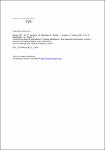Overcoming species boundaries in peptide identification with BICEPS
Renard, Bernhard Y.
Xu, Buote
Kirchner, Marc
Zickmann, Franziska
Winter, Dominic
Korten, Simone
Brattig, Norbert W.
Tzur, Amit
Hamprecht, Fred A.
Steen, Hanno
Currently, the reliable identification of peptides and proteins is only feasible when thoroughly annotated sequence databases are available. While sequencing capacities continue to grow, many organisms remain without reliable, fully annotated reference genomes required for proteomic analyses. Standard database search algorithms fail to identify peptides which are not exactly contained in a protein database. De novo searches are generally hindered by their restricted reliability and current error-tolerant search strategies are limited by global, heuristic tradeoffs between database and spectral information. We propose a Bayesian Information Criterion-driven Error-tolerant Peptide Search (BICEPS) and offer an open-source implementation based on this statistical criterion to automatically balance the information of each single spectrum and the database, while limiting the run time. We show that BICEPS performs as well as current database search algorithms when such algorithms are applied to sequenced organisms while BICEPS only uses a remotely related organism database. For instance, we use a chicken instead of human database corresponding to an evolutionary distance of more than 300 million years (Nature, 2004, 432:695-716). We demonstrate the successful application to cross-species proteomics with a 50% increase in the number of identified proteins for a filarial nematode sample of litomosoides sigmodontis.
No license information

